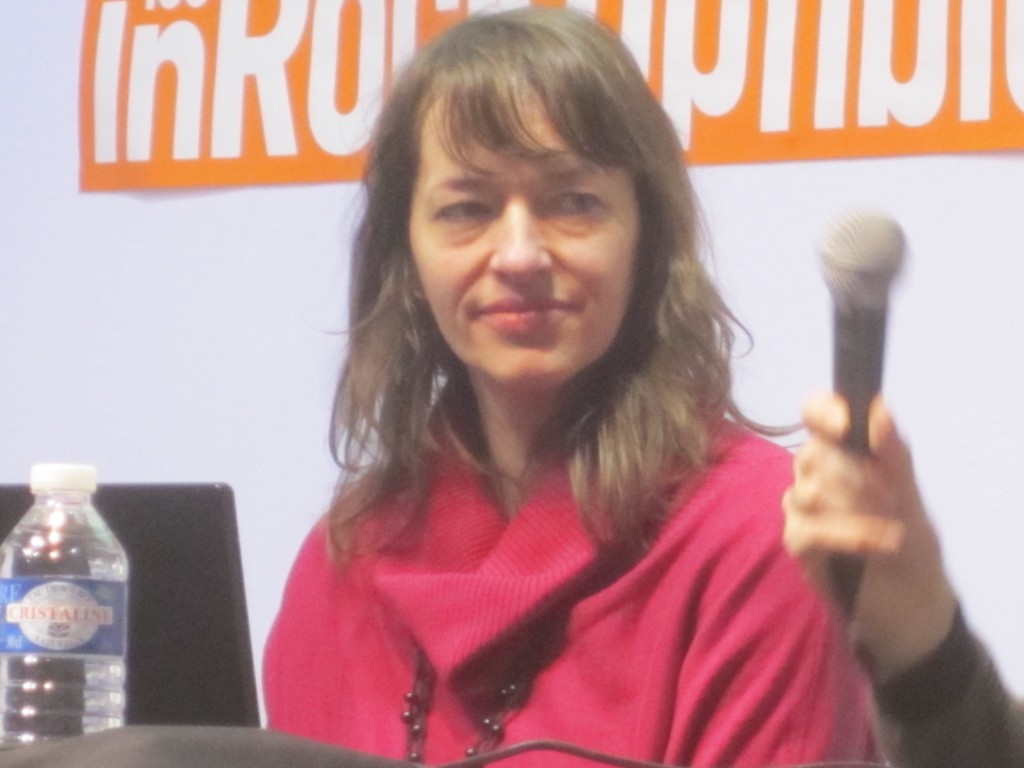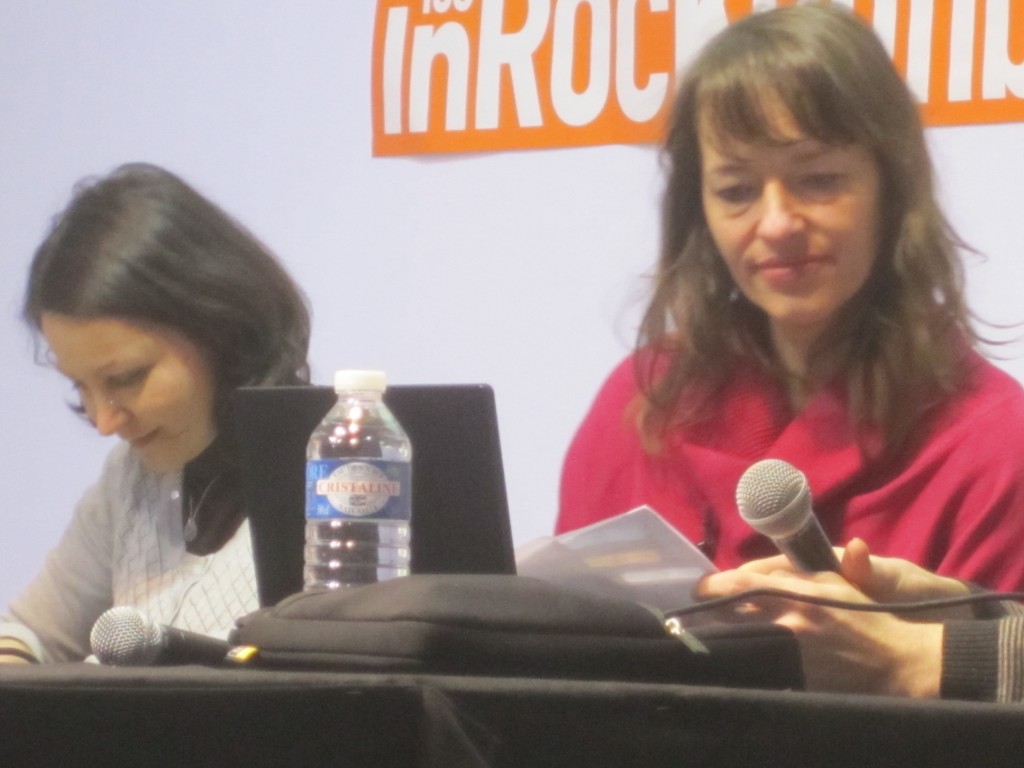Austrian Ulli Lust was one of ten women whose graphic novels figured among the Angoulême Festival’s 58 Official Selections this year. Her heady, liberating, life-hungry road memoir of punk youth in Europe, Trop n’est pas assez [Too Much Is Not Enough], from the small French press Ça et Là , was the only German-language nomination. It shared the Prix Révélation for best new talent with another memoir: Elodie Durand’s La Parenthèse [The Parenthesis], a somber chronicle of a battle with brain-tumor-related strokes and amnesia.
I had the pleasure to attend a public interview with her while at Angoulême. Lust speaks in English, and sits beside her interpreter, who relays her words to the French-speaking crowd of mostly teenaged girls. Halfway through the long festival day, in the hot and crowded indie comics tent, she looks a little like a bedraggled Charlotte Rampling, but the odd question brings her to rapt and startling life: a gush of gratitude or enthusiasm giving us a glimpse of the spiky-haired devil-may-care girl of 17 immortalized in her own book.
“I remember everything from when I was 17,†Lust muses. “Last year, not so much.â€
Set in summer 1984, Too Much tells the story of Ulli and Edi, who sling a sleeping bag over one shoulder and set out with nothing—not even IDs—but the clothes on their backs.
“I’d left home for fashion school and turned punk because I fell in love with a guy. But I was too optimistic to last as a punk. I left home without a thought for my parents, even though I got along with them.†Lust manages to be abashed and gracious all at once, good-humored about her own embarrassment. “I’m glad my son didn’t do that to me.â€
Ulli and Edi’s journey lasts two months and covers the length of Italy: Vienna to Sicily by way of Verona, Rome, and Naples.
“I didn’t want to give up and prove them right,†she says of her parents. “I wanted to be in the world, not in school or at a job. We were proud to live on the underside then, grungy, almost criminal. We were proud to say adults didn’t know shit. Society looked down on us, and we were proud of that.
“Now I like to sleep in soft beds,†she adds wryly.
First published in October 2009 in Germany by Avant-Verlag as Heute ist der Letzte Tag vom rest deines lebens, Too Much was translated into French by Jörg Stickan, and clocks in at 464 pages.
“It seemed like a 200 page idea,†protested Lust. “I was a bit afraid of telling this story at first: it’s full of violence, and hard living. Once I got into the drama, loving the people, I forgot how embarrassing it was.â€
The book has been widely hailed for its strong female viewpoint, and candid, critical eye for the many varieties of machismo.
“You have to understand, I come from a small village. You could act out there, but the contrast with Sicily too great. It was dangerous, being an emancipated woman there. It wasn’t the Mafia, they had a code of honor—no violence to women. It was more delinquents on beach,†she says, referring to one of the book’s more shocking episodes. “I was deeply shaken when I finally got back. I holed up at home for a while. Family was a safe place.â€
“The first year I spent working on the book, I was just writing down memories. I used excerpts from the diary I kept at the time for the narration. Later, I went on a research trip to Italy, to get the visuals right, photoreferences, the details of daily life: street signs, coffee cups. I wanted it to be realistic. Of course, Italy’s changed a lot since then.
“I’ve kept a diary since I was 12. But I stopped keeping such a close record after Verona, because what we did wasn’t always legal.†She blushes. “There were probably lots more merry evenings: I left them out, sorry!â€
An important turning point for the story and in Lust’s life was the time spent in a house with South African painters in Sicily. One of them saw her doodling, and told her she had talent. “Why are you wasting your life with us fucks?â€
“I didn’t believe him, of course,†says Lust, the unsure and self-deprecating teenager showing through.
The book is not, Lust insists, a Bildungsroman. “There’s nothing to be learned from it, no lessons. After all, what would it be: everybody’s better off staying at home? I just wanted to honor the truth of human experience of it.â€
Lust settled in Berlin in the mid ‘90s, where she says what few comics artists there are form a “small, familiar scene.†There’s “no competitiveness,†and anyway, “few prizes to be had.†The resolutely uncommercial environment supports experiment and has “great deal of unexplored potential.
“Like the Belgians,†Lust asserts, referring to one of the festival’s main exhibits: a survey of the avant-garde Francophone Belgian comics fringe.
Too Much was fairly successful in Germany and a legitimate smash hit in France. A few “high culture†newspapers ran articles on how “my heroine doesn’t read,†and Lust finds journalists often ask her: what is a graphic novel?
“You have to give them a handle on it, two or three other reasons to write about your book besides the book itself. I have to admit I was a bit afraid of the French release, because there’s such a long Francophone tradition of narrative comics. There isn’t much in what used to be West Germany, though there’s more of one in the East. At any rate, my influences weren’t German,†she reports when asked, quite surprisingly citing Alan Moore and manga instead.
When asked about the future of the medium, Lust is happy to bring up Electrocomics, an online comics publishing company she founded.
“The net is one possible future for comics,†she avows. “A wonderful freedom, an open space.
I like it now, but I’m not sure if I will in the future.
“I’m nostalgic, and prefer paper,†she concludes.
Lust next project is an adaptation, due in 3 years, of a Marcel Beyer novel, Colors of the Night. There’s an appreciative murmur from several members of the audience, who seem to have read it. Lust was invited to adapt it by a “major publisher who wants to do graphic novels.†The novel, set during World War II, concerns Goebbels’ children and is narrated by his eldest daughter, later murdered by her parents. Lust seems invigorated by the project.
“I enjoy exploring something new. Success relaxes you to pursue new avenues, to stretch yourself. You’re less tormented about how good you are; you’ve done something already, and no one can take it from you. Then again,†she smiles, “this book is totally different: maybe no one will like it.â€




Leave a Reply